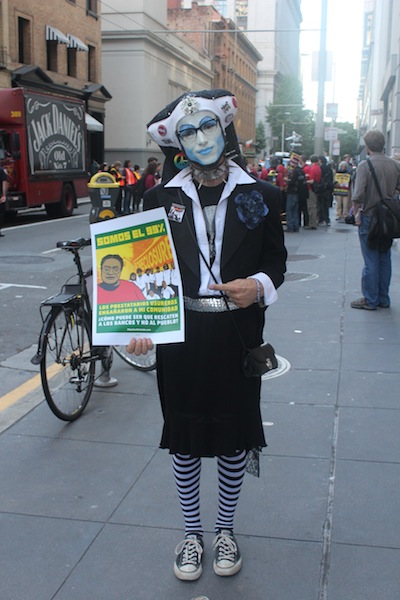San Franciscans took to the streets today to express their frustration with banks and a host of other economic institutions.
About 200 protestors blocked all three entrances to the Wells Fargo headquarters downtown, chanting, singing songs and waving signs. While the protestors offered a variety of opinions and messages, they all seemed more or less unified around the feeling that most Americans — “the other 99 percent” — are suffering while a tiny minority of the wealthiest see increased profits, reduced taxes and a general lack of accountability for the overall country’s economic health.
“We’re here because many people have lost their homes because of foreclosures by Wells Fargo,” said Barbara Roose, a Berkeley, Calif. resident who came to the protest with her son and grandson.
“Many, many large corporations pay no taxes while the rest of us suffer,” continued Roose’s son, Mateo Nube, of Oakland, Calif.
It’s not an unusual sentiment in San Francisco, a famously liberal city with a long history of support for labor movements and anti-corporate sentiment. But it does illustrate one striking note of discord in the city to the north of Silicon Valley, one of the country’s biggest engines of entrepreneurship and the cradle of large corporations (such as Google, Apple and Oracle) and of billionaire founders (such as Larry Page, Steve Jobs and Larry Ellison). This part of the world is famously friendly to startups, entrepreneurs and technology companies, as well as the venture capitalists and banks that facilitate them. But the region also has a strong current of anti-corporate and anti-financial sentiment.
One protestor, Charles Smith, parked himself in front of the bank’s ATMs with a big sign calling for a general strike. A retired member of the American Federation of State, County and Municipal Employees Local 444, Smith said that a nationwide strike was the public’s only option for getting their demands met.
“This is an economic issue, not a moral issue,” said Smith. “The only option available to the other 99 percent is a general strike.”
One woman, who gave her name only as Rachel, said that she came to the protest because of her concern over the inequalities in the economy.
“The economic system isn’t working for the 99 percent,” she said, pointing to joblessness, poverty and lack of health care. Meanwhile, she said, “There are record profits for banks. The inequity is appalling.”
“It’s a global thing and it’s not going to end until it all evens out.”
The majority of protestors gathered in front of the bank’s main entrance, but a secondary group blocked the side entrance. A singer, Sky Nelson, played guitar for protestors as police stood by in front of the bank’s empty lobby.
In contrast to other recent protests in San Francisco, this demonstration seemed very well organized. A media representative spotted me taking photos and gave me a press kit.
The protest remained peaceful. While demonstrators had blocked traffic and snarled the morning commute, police were on the scene in force by 9am and were keeping people out of the street. A long line of motorcyles stood by, with police standing around in case things turned ugly.
Even the bank’s back loading entrance was blocked by protestors. It was there that the protest’s best music was to be found, with a brass band, the “Liberation Brass Orchestra,” playing funky and somewhat wooly New Orleans-style jazz (see video below).
While Wells Fargo was shut down completely, other banks in the neighborhood were unaffected by the protests. Citibank, California Bank, Bank of the West, the Far East National Bank and even the Bank of Guam (“The People’s Bank”) all remained open.
Photos and video by Dylan Tweney/VentureBeat.
VentureBeat's mission is to be a digital town square for technical decision-makers to gain knowledge about transformative enterprise technology and transact. Learn More

